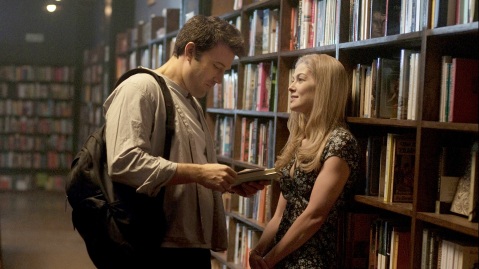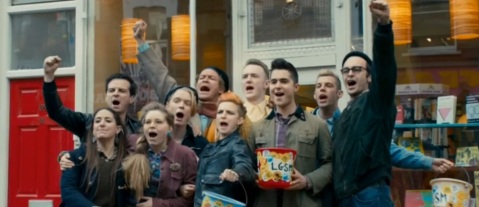Review: Gone Girl
Released: 2nd October
Certificate: 18
Director: David Fincher
Screenwriter: Gillian Flynn
Cast: Ben Affleck, Rosamund Pike, Carrie Coon, Kim Dickens, Neil Patrick Harris, Tyler Perry
On the afternoon that Nick Dunne (Ben Affleck) is supposed to celebrate his fifth wedding anniversary, he comes home to find his wife Amy (Rosamund Pike) missing amid signs of a struggle in their immaculately furnished living room. As the present day narrative unfolds interleaved with increasingly unsettling flashbacks taken from the missing Amy’s diary, the police, the media and Amy’s family begin to wonder if Nick knows more than he’s letting on. When evidence mounts and the media circus closes in, only Detective Rhonda Boney (Kim Dickens) and Nick’s sister Margo (Carrie Coon) appear willing to give him a fair hearing.
Fincher and Flynn’s neat adaptation effortlessly preserves the uncomfortable feeling of shifting foundations that pervaded Flynn’s 2012 novel upon which the film is based. Affleck plays Nick with a hollow-eyed, hang-dog demeanour which could equally be interpreted as shell-shock or guilt, his performance daring the audience to attempt to make a judgement one way or the other before another revelation forces re-evaluation. Pike’s Amy is equally disarming, her flashback self of happier days contrasting sharply with how Nick describes her in the present. Carrie Coon shines as Margo, perfectly illustrating her confusion as her loyalty to Nick is tested by stressful circumstances and uncomfortable realisations.
Interestingly for a film based around a sudden and unexplained absence, Gone Girl is a nuanced exploration of appearances: how, when and most importantly why we create them, how they serve us and ultimately, the consequences of casting them off. Amy struggles to keep up with the squeaky-clean protagonist of her parents’ series of children’s bestsellers, Amazing Amy. When faced with the increasingly intrusive media circus, Nick must be mindful of how he is ‘supposed’ to behave even as he attempts to deal with what we believe to be his real grief and confusion.
The film (like the book) is uncompromising to the last, daring to leave a sour taste in the mouth having torn apart the concept of love as surely as a cat will take its claws to an expensive sofa. Gone Girl is not, however, a perfect work. Elements of the latter acts place the gender politics of the film in a problematic space, and the absence of Nick’s first person narrative (his voice in the book is as vital a presence as Amy’s) places more scrutiny on her character. Rendered cinematically, the holes in the police procedural elements of the plot become more evident and the moustache-twirling nature of certain characters’ schemes veers dangerously close to the ridiculous despite Fincher’s naturalistic direction.
Despite these reservations, Gone Girl is a complex and engaging thriller which more than scratches the surface of the inherently deceptive and demanding nature of love. Just be careful of what that scratching leaves under the fingernails.
Verdict: 4/5
[Image credit: http://www.gonegirlmovie.com]
Review: Pride
Released: 12th September
Certificate: 15
Director: Matthew Warchus
Cast: George MacKay, Ben Schnetzer, Joseph Gilgun, Imelda Staunton, Bill Nighy, Dominic West, Andrew Scott
An England beset by homophobia, a year-long miner’s strike and a burgeoning AIDS crisis seems an unlikely setting for a comedy. However screenwriter Stephen Beresford neatly realises both the comic and tragic potential of the story of a group of London-based gay and lesbian activists determined to support the striking miners in the industrial action of 1984-1985.
The film begins at the London Gay Pride parade in 1984, where 20-year-old “I don’t want to be too visible” Joe (George MacKay) is reluctantly pulled into out-and-proud ideas man Mark’s (Ben Schnetzer) group of bucket-shaking activists. Noticing that the tabloids and police are demonising the striking coal miners in much the same way they demonise the gay and lesbian community, Mark and his band of activists decide to lend their support. Unfortunately, the unions are too embarrassed to take their money. In fact, everyone is until a garbled phone message leads to the group travelling to meet Paddy Considine’s Dai, a representative from a small mining village in rural Wales. While the council members (including Bill Nighy, Imelda Staunton and the fabulous Jessica Gunning) get over their initial trepidation to welcome Lesbians and Gays Support the Miners (LGSM), not everyone is happy.
Pride is a film of ideas neatly explored and skilfully juxtaposed, where –fittingly- it doesn’t help to hold on to judgements made in the first instance. Dominic West’s disaffected actor has hidden reserves of charm and compassion, flighty Mark is able to keep pushing the LGSM forward despite setbacks, and Joe finds courage he never knew he had. Prejudice- not just hatred or disgust but the idea of thinking you know exactly how someone is going to be before you meet them- is unsurprisingly a running theme. The representatives of the village council fear how their masculine, blue collar residents will react to the arrival of LGSM, and the group has trouble recruiting gay men who have suffered homophobia in rural communities in their past. Joe’s mother’s pronouncements on the loneliness of the gay ‘life’ contrast starkly with his broad grin after his first LGSM weekend. The ensemble cast work well together and the characters and situations are well realised, and Pride neatly pulls off the trick of balancing sometimes riotous humour with naturalistic pathos , a hallmark of British comedy.
Verdict: 4/5
Quote: “We’re just on our way to Swansea for a massive lez-off!”
[Image credit: http://www.bbc.co.uk/bbcfilms/film/pride ]
Recent Posts
Archives
- September 2017
- February 2017
- January 2017
- November 2016
- October 2016
- September 2016
- June 2016
- April 2016
- March 2016
- February 2016
- January 2016
- December 2015
- November 2015
- October 2015
- September 2015
- August 2015
- July 2015
- June 2015
- May 2015
- April 2015
- March 2015
- February 2015
- January 2015
- December 2014
- November 2014
- October 2014
- September 2014
- August 2014
- July 2014
- June 2014
- May 2014
- April 2014
- March 2014
- February 2014
- January 2014
- December 2013
- November 2013
- October 2013
Categories
- 1961
- 1982
- 1985
- 2010
- 2011
- 2012
- 2013
- 2014
- 2015
- 2016
- 2017
- 2D
- 3D
- Cinema
- Classic Reviews
- Collections
- DVD
- films
- Genre: action
- Genre: animation
- Genre: biopic
- Genre: comedy
- Genre: drama
- Genre: fantasy
- Genre: horror
- Genre: LGBTQ
- Genre: musical
- Genre: period drama
- Genre: sci-fi
- Genre: superheroes
- Genre: thriller
- Genre: western
- Netflix
- Preview Article
- Rating: 1/5
- Rating: 2/5
- Rating: 3/5
- Rating: 4/5
- Rating: 5/5
- Reviewed by: AES
- Reviewed by: SO
- Reviews
- Top 5 List
- Uncategorized


Recent Comments